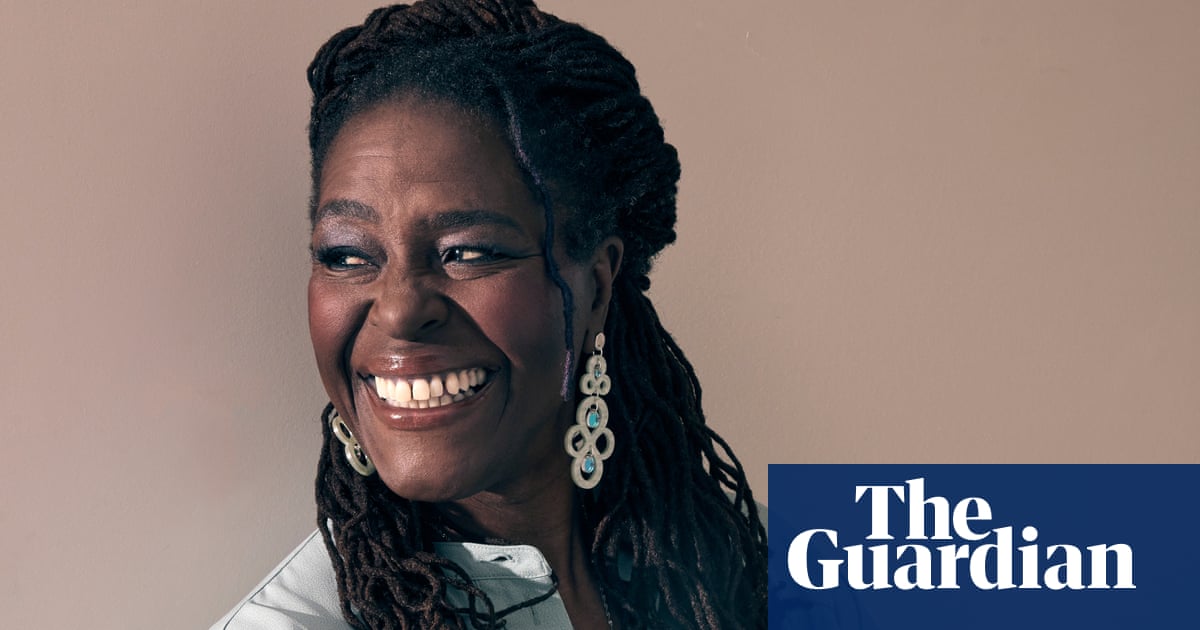Pure charisma – that’s the best way to describe Sharon D Clarke. As she has her picture taken, she fills the room with easy laughter, dancing along to Bob Marley. At 58 years old, the Londoner is one of Britain’s most commanding performers. During a three-decade career she has lit up the West End (winning three Olivier awards) and become a household name (as the formidable Lola Griffin in Holby City). Last year, she also starred as DCI Ellis in the Channel 5/Acorn TV crime drama Ellis, and brought sparkling levity to the National Theatre’s production of The Importance of Being Earnest, alongside Ncuti Gatwa. Now, Clarke has earned her first Bafta TV nomination for her searing performance inMr Loverman, the BBC adaptation of Bernardine Evaristo’s novel, in which she plays Carmel, the wife of Barrington, a closeted Caribbean man grappling with his sexuality late in life, played by Lennie James.
You’re nominated for a Bafta for Mr Loverman. What was it like working on the show?I had a blast. I could not be more proud of it. And it’s the only show I have worked on in my whole television career that has been truly diverse, top to bottom. I’ve been on so many sets where I’m the only person of colour.
Why is it important to tell stories like Barrington’s?Barry’s story could have easily been my story. I lost a lot of friends when I came out – I grew up in the time of section 28. To be part of a show like Mr Loverman, which shows why people, especially from the Caribbean community, might have felt they had to hide who they were, is very important.
Is that especially poignant in this political climate?We’re in a crazy time – there is a madness at the moment. People want to move us backwards. Baby, I’m willing to take up arms – really!
You were on Holby City for15years. What do you think about the budget cuts to soaps happening at the moment?Money is tight everywhere. But it’s important that we have terrestrial channels, not just streaming. And soaps are also a great way of discussing social issues. Because it’s not just a kid in the bedroom on their computer, but a family watching something together. You can discuss things, educate your kids, and your kids can educate you.
However we can protect them, we have to try. But sometimes, in this climate, that’s going to mean cutting stuff down. I say, it’s better we cut stuff down than it goes altogether.
You played the lead role as a detective inEllis last year. How did you navigate thehistorical suspicion from theblack communitytowards the police when approaching the role?The show is based on Merseyside’s first black female detective, and I spent a lot of time with her, learning about her experiences. And listen, when Cressida Dick said [in 2020] that there is no institutional racism in the police force … how much of a fool did she look? We have the marks and the scars and the funerals to show that it exists.
You’ve talked about being typecast in the past – what was it like to have such a different leading role?People were saying to me: “Oh, it’s so refreshing to have this black female lead detective.” And I’d be like: “It might be refreshing for you. For me, it’s long overdue.” When I started doing television, I would only be seen as a nurse. I played so many that I got to the point where I was like: “I can’t do it any more.” So I removed myself from television and didn’t audition.
Being typecast, is that a uniquely British thing?When I was growing up, my world was multicultural, but my television was not. I couldn’t see myself for love nor money. When I first went to the States and watched American TV, it was different. In Britain, people are being sidelined. We have so many wonderful, talented, black British actors who had to leave Britain in order to work. And that is still happening, even Idris Elba!
You played Lady Bracknell inThe Importance of Being Earnestlast year. Was it nice to work on something more lighthearted?For years, I did work that was pure bawling, crying, digging deep into a well of emotion. So when Importance came along, I was like: “OK, I can just have fun.” And working with Ncuti, I mean, come on! What’s not to love? Oscar Wilde would have been delighted.
The production has been praised for bringing younger and more diverse audiences to the theatre. How should theatres build on this?People just have to work harder, to go into those communities and let them know that these shows are going on and that theatre is for them.
Are Black Out nights a solution?Sometimes I think, do we have to have a night to say, “Black folk, you can come?” I’m not sure how I feel about that. Theatre should just be made accessible so people feel they can come any night.
Is there a TV show you’ve binge-watched this year?The only thing I’ve watched in its entirety isAdolescence. It was just astounding – harrowing, honest, real. Stephen Graham: hats off.
What do you do to wind down?Watch Gogglebox. I remember my niece telling me about it and I was like: “I don’t want to watch people watching television!” Now I love it, and it gives me a feel of what’s happening in the nation.
The BaftaTelevisionAwards with P&O Cruises is on BBC One and BBC iPlayer tonight at 7pm.
Catch the full lineup of our Bafta TV special launching across the weekend and starring best actor nominees David Tennant, Lennie James, Monica Dolan, Billie Piper, Richard Gadd, Marisa Abela and Sharon D Clarke
Read more in the series
